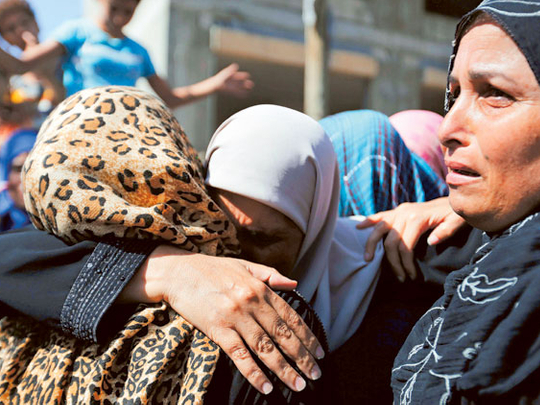
Abassan, Gaza Strip: Samir Asfour, 57, held a mobile phone that never stopped ringing in one hand, a cigarette in the other. His Palestinian passport was sticking out of the chest pocket of his white jalabiya.
“I will travel whenever I can,” he said, speaking nervously outside his home in Abassan, a small town east of Khan Younis in the southern Gaza Strip. “I need to go and bring back their bodies from wherever they are.”
Asfour’s son Ahmad, 24, and three of Ahmad’s cousins, ages 17 to 27, are among dozens of young Gazans missing in the Mediterranean. Asfour last heard from them on September 6, a week after they left Gaza for Egypt. There, they intended to board an illegal migrant ship bound for Italy. Their final destination was not clear, but relatives said they had been heading to Europe in search of jobs and better medical care.
The ship, with about 500 migrants aboard, sank last week off the coast of Malta after it was rammed by human traffickers on another boat during an argument with the migrants, according to survivors. Nearly all aboard are believed to have died.
Asfour said he had contacted one survivor who made it to Malta, Mamoun Doghmosh, who confirmed that he had seen Ahmad on the boat. Asfour said he was sure that his son was dead because he was sick and could not swim.
The recent war between Israel and Hamas, the group that dominates Gaza, prompted a wave of attempts by Palestinians to reach Europe with the aid of Egyptian smugglers, despite — or perhaps because of — Israeli and Egyptian restrictions on regular movement in and out of the Palestinian coastal enclave.
Fleeing conflict, unemployment and an outlook that many here described as hopeless, at least 1,000 Palestinians have left Gaza in the past three months seeking passage to Europe, according to Palestinians tracking the migration, joining the increasing flow of asylum seekers and migrants from Syria, and from Egypt, Sudan and other parts of Africa who set out from ports in Egypt and Libya. Facebook posts by those who made it safely to Europe encourage others to attempt the journey.
But the deadly shipwreck has suddenly shined a light on the exodus, and for the distraught relatives back in Gaza, it has underscored the risks involved. The Euro-Mid Observer for Human Rights, an organisation based in Geneva with an office in Gaza, said 90 Gaza residents were among the hundreds missing and feared dead in the shipwreck, though information about the dead, the missing and possible survivors has been scarce here.
Call for international action
Zeid Ra’ad Al Hussain, the UN human rights chief, on Friday condemned what he said appeared to be a “mass murder in the Mediterranean” and called for concerted international action against traffickers.
“The callous act of deliberately ramming a boat full of hundreds of defenceless people is a crime that must not go unpunished,” Zeid said in a statement from his Geneva office.
The ramming was just the worst case among four or five other boat singings over several days.
For many, the journey out of Gaza began in a smuggling tunnel running beneath the border with Egypt. But because Ahmad Asfour and his cousins were wounded in an Israeli air strike in Abassan during a previous Gaza conflict, in 2008-09, they had medical records allowing them to enter Egypt legally, via the Rafah border crossing, on the understanding that they would receive treatment, Samir Asfour said.
Ahmad had the worst injuries. He lost sight in one eye and part of his pancreas. Leg injuries prevented him from walking long distances. After that earlier war, he initially received treatment in Egypt, then in Israel, and he was arrested and spent three years in an Israeli prison, his father said, declining to elaborate.
After his release in 2012, Ahmad could not find a job and received welfare payments of 800 shekels (about $220) a month. The Palestinian authorities said they could not pay for further treatment.
“We reached a dead end,” Asfour said.
Before boarding the boat in Egypt, Ahmad and his cousins phoned their relatives in Gaza and asked them to pay the smugglers through a money-changing store in Khan Younis.
“They are a network,” Asfour said. “The smugglers have agents here, and they are like the Western Union.”
Asfour and his sister-in-law Samah Asfour, the mother of one of the cousins, Raed, 17, went to the money changer together and paid $2,000 for each of the four. Samah Asfour said that the usual cost was $1,500, but that the money changer had told her that the extra cash would ensure their sons a place on a large, sturdy ship, not a small one that could sink.
“We paid more so our boys would be safe,” she said.
They were hoping to find medical treatment, jobs and a better future than the one they saw for themselves in Gaza.
“They went for treatment. Why would we send them there?” she said. “This country doesn’t care for them, and they are desperate. They were seeking a good life.”
Samir Asfour said he spoke to one of the smugglers in Egypt on his son’s mobile phone.
“I asked him to take care of Ahmed because of his special situation,” Asfour said. “The smuggler told me not to worry and said Ahmad should only bring with him boxes of bottled water and juice and a box of dried dates.”
Other Gazans described how relatives left through the tunnels at Rafah in groups organised by a smuggler, paying him $1,500 per person and $2,000 for the boat runners.
— New York Times News Service











